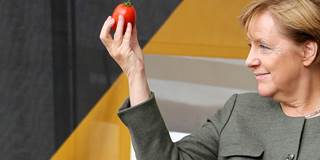As Germany prepares for this month’s federal election, the country seems remarkably resistant to the populist challenge that other Western societies have faced. But weak support for extremist parties doesn’t mean that Germans are satisfied.
BERLIN – As Germany prepares for this month’s federal election, the country seems remarkably resistant to the populist challenge that other Western societies have faced. With the right-wing populist Alternative für Deutschland (AfD) and their far-left competitors Die Linke both hovering at around 10% in the polls, a victory for Chancellor Angela Merkel is widely viewed as the most likely result. But that doesn’t mean that Germans are satisfied.

BERLIN – As Germany prepares for this month’s federal election, the country seems remarkably resistant to the populist challenge that other Western societies have faced. With the right-wing populist Alternative für Deutschland (AfD) and their far-left competitors Die Linke both hovering at around 10% in the polls, a victory for Chancellor Angela Merkel is widely viewed as the most likely result. But that doesn’t mean that Germans are satisfied.